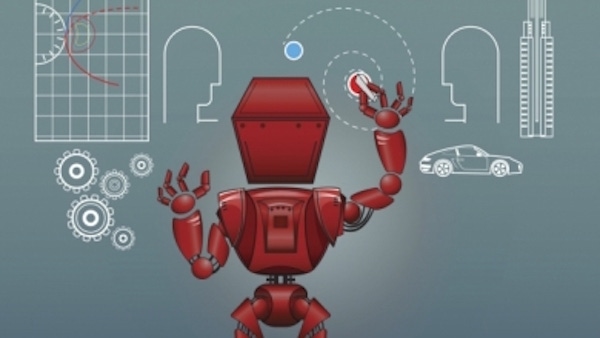Humans have always feared the power of their own creations. From Frankenstein’s monster to Oedipus, we tend to believe we have the creative potential to destroy ourselves.
December 7, 2016

“Humans have always feared the power of their own creations. From Frankenstein’s monster to Oedipus, we tend to believe we have thecreative potential to destroy ourselves. This seems especially true of mechanical automation. The first great industrial revolution of the late 18th century brought such social upheaval that the philosopher Mr. Thomas Carlyle lamented the ‘demon of mechanization,’ and 200 years later, the digital revolution of the late 20th century was met with similar hand-wringing.”
-Jonathan Openshaw, editorial director, The Future Laboratory
In this Doyle Report, I am returning to a topic that I have written about previously: the likelihood that a robot will take your job or one of those under your management.
Writing for “The Journal,” Openshaw notes that, “The Boston Consulting Group forecasts that a quarter of all jobs will be replaced by automation by 2025, and the Bank of England recently announced that 48 percent of all human workers will eventually be replaced by robotics.” This comes on the heels of a report from White House economists, as reported in “Huffington Post,” that said there is “an 83 percent chance that workers earning less than $20 per hour will lose their jobs to robots.”
New research from McKinsey & Co. published in “McKinsey Quarterly” suggests things may not be as dire as all that. The management consultant’s study suggests that automation will impact almost all jobs but “eliminate very few occupations entirely in the next decade.” Technologies available today “could automate 45 percent of the activities people are paid to perform,” McKinsey says. Furthermore, the company reveals, “about 60 percent of all occupations could see 30 percent or more of their constituent activities automated.”
McKinsey has analyzed more than 800 occupations and assessed the “technical feasibility” of whether they could be automated. While some assessments aren’t surprising—it’s easier to automate a job that involves boxing merchandise than it is one that involves using a chainsaw in a forest—others aren’t. It’s bottom-line assessment: nearly one in six manufacturing jobs could be automated.
Those impacted (or assisted) will include knowledge workers who work in healthcare and finance. This includes Wall Streeters who make upwards of $200,000. They could be impacted due to fact that they spend as much as a third of their time on tasks that are ripe for automation. (Think data entry, forms processing, etc.)
All this automation may not necessarily be a bad thing for some professional occupations. Consider surgeons. Today, decision support systems and advanced robotics are helping physicians, including operating room surgeons, make better care choices and provide more precise surgical care. The decision support systems remind physicians about optimal treatment protocols and double-check their prescription recommendations for drug conflicts. While initially viewed with skepticism by the medical community when introduced, they are now a staple of modern medicine at both the bedside and in the operating room.
While we are on healthcare, did you known that some of the nation’s leading care providers employ as many data informaticists as they do attorneys or even care providers in key departments? Salt Lake City-based Intermountain Healthcare, one of the nation’s leading care providers, employs more 200 data scientists. They spend their days poring over patient records, insurance claims and industry research to create software tools and data products that help care providers.
Couldn’t you use a little support to help you run your solution provider company or its employees?
Before you answer consider this: The very thing that people despise most—managing fellow workers—is one of the jobs that is least likely to be automated. Middle-management may be unpleasant, but it may be a safe harbor (until, of course, there are no people left in the workforce to automate.)
Which brings me to you. If you’re worried about the future of your job or those of your employees, then take a short quiz to assess vulnerability:
Do you manage others?
Does your work require that you apply expertise known only to you?
Are you in a position to improve customer satisfaction or business outcomes?
Are you the “face” of anything that your company does?
Do you “teach” or otherwise provide guidance?
If you can answer “yes” to at least three of those, then your position is probably secure, so long as you’re doing it well, of course. For more insights, try this amusing job assessment tool created by the BBC.
Now, you’re probably wondering about chatbots, which are less than a decade old but rapidly changing the world of customer support and more. Maybe you have customer support specialists. Maybe you provide tier one support yourself. Could a chatbot eliminate or reduce your value?
The sober answer is yes. In July 2016, “Venture Beat” published a story entitled, “10 jobs that A.I. and chatbots are poised to eventually replace.” “Web designer” and “online marketer” were No. 1 and 2 on the list. (In case you’re wondering, “editor” was No. 7.)
Which brings me to this: a great many Americans who worry about our economy lament the loss of manufacturing jobs and the stability they provided the middle class for decades. But more upheaval is likely on the way. The new service industry jobs that displaced manufacturing workers have taken are among the jobs most susceptible to automation, according to McKinsey. If you thought laborers were upset when they lost their lost manufacturing jobs to cheaper foreign labor, then imagine how distraught they will be when they those their jobs in food service or hospitality to a robot?
Along with climate change, human capital will be one of the biggest issues of our time.
About the Author(s)
You May Also Like


